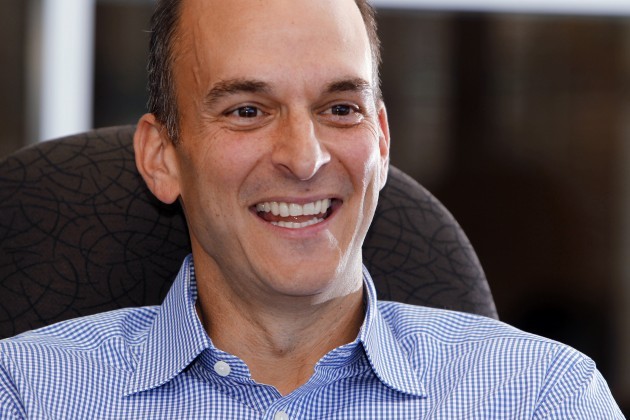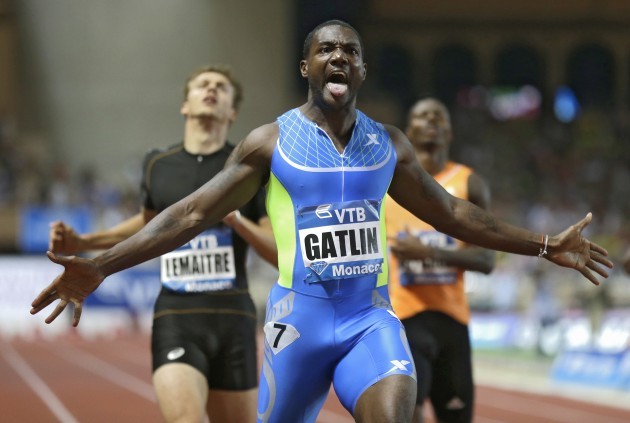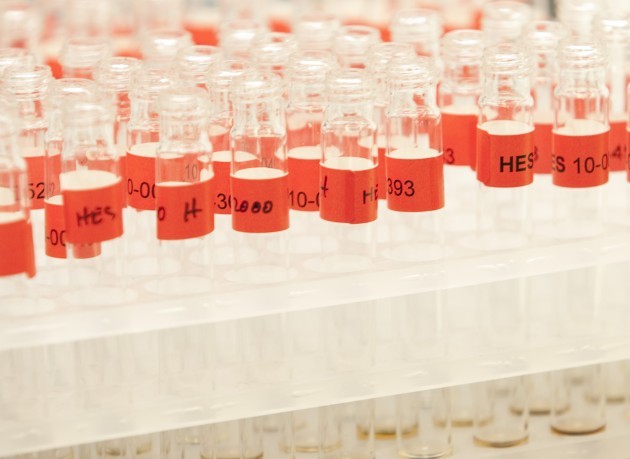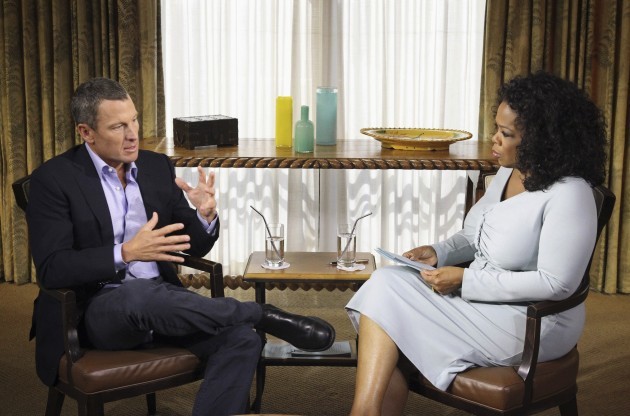TRAVIS TYGART, THE chief executive of the US Anti-Doping Agency and the man who ultimately exposed Lance Armstrong and the US Postal team, was in Dublin to speak at an anti-doping seminar yesterday.
Afterwards he sat down for an interview with TheScore.ie. The following is an abbreviated transcript of that conversation.
Q: Are you winning or losing the war on doping at the moment?
TT: I’m hopeful we’re as far ahead as we’ve ever been and, most importantly, giving hope to clean athletes that they can not only compete clean but that they can also win today clean.
That doesn’t mean that we can give up and that it has been won. We have to be candid about the win at all costs culture that affects every sport at every level, in the US at least, right the way down to youth participation. People play to win and so we can’t be naive to think that it’s going to go away.
At the heart of it, having WADA policy in place and full implementation of that policy gives athletes today more hope than they’ve ever had that they can win in the right way.
Q: Do you have a sense of where the next big battleground might be?
TT: Outside of testing, the funding mechanism for what we do is the basis for our success to some extent. There’s a minuscule amount of money being paid to resource anti-doping efforts. You look at the $800 billion to $1 trillion that flows into sport and it’s too small of a percentage. It’s less than half of one percent.
I think by most estimates $300 million is spent on anti-doping. It’s woefully inadequate for what we need to do to ensure that all athletes’ rights are upheld.
That said, athletes are going to use the drug that gives them the maximum performance benefit, that they have the lowest chance of testing positive for, that costs them the least amount of money.
I don’t think it’s genes or genetic doping because that’s off the chart expensive and we have some mechanisms in place that could otherwise detect it. Whether it’s blood manipulation or blood transfusions or designer steroids …
Q: Do you believe in second chances?
TT: Oh yeah, absolutely. I think the rules inherently and implicitly adopt that concept.
There’s two things. One, in life, everybody makes huge mistakes and has things that they wish they didn’t do over and shame on us for not learning from those mistakes, but you have to try to right your wrongs.
The second is once you’ve done your time under the rules and you’ve served your time, the rules allow you to come back in place. I think what’s really unfair is when the rulemakers and those who enforce the rules don’t do it evenly and fairly because they don’t like the outcome in a particular case.
If we want to change the rules, let’s go through the process and change the rules, make it a lifetime ban for a first offence or whatever we think can be supported by clean athletes and provide an effective deterrent and is under certain right to work laws, but you can’t move the goalposts mid-game. That’s not fair.
Q: Do you expect fans and spectators to believe in second chances?
TT: I think they do. The rules provide for it. You can understand if their country’s team loses out to someone who has served their ban and is back competing and beats them. Is that going to be an excuse as to why they lost? Of course, but I think we have to abide by the rules and respect the rules that are in place, and evenly and uniformly enforce those rules.
Q: The most high-profile case at the moment is Justin Gatlin. Did anything about his nomination for World Athlete of the Year strike you as incongruous given his past?
TT: I understand people not liking it and questioning it. It’s one of the informal consequences of doping, the dark cloud that hangs over someone’s head and will follow them for the rest of their life.
The rules — and that’s what we’ve to focus on as the rules enforcers — the rules allow for Justin Gatlin or any other athlete, once they have served their time as he has done all the way up to the Supreme Court of Sport, the rules allow him to have full privileges of competing once he has served his time.
Shame on us if we change the rules mid stream just because we don’t like the outcome in one particular case.
Q: In general, would you like to see a change in the rules?
TT: If I’m an elite level athlete competing today and I’m clean, I’d hope that it would be one strike and you’re done. That’s where I would land on it.
That’s not a gambit the world has agreed to. We spent two years going through that process with the World Anti-Doping Code. A new code will go into place on 1 January and what it calls for is four-year sanctions for a first offence and could be up to life for numerous offences or different types – covering up or trafficking etc.
Those are the rules the world has agreed to and it was a lengthy consultation process. I have to rest on the principle of finality in the rule once you’ve gone through a fair process. You can’t go back and retroactively change it because you don’t like the outcome in one particular case.
Q: When you sit down to watch sport as a spectator, do you believe what you’re seeing?
TT: I think the athletes competing deserve for us to believe in what they’re doing unless and until the evidence by the appropriate authorities, through that legal process, determines that they have done something in violation of the rules.
I think they deserve it. I think as sports fans that’s what we owe them and really rely on anti-doping authorities to do the ugly dirty work of enforcing those rules.
I cheer every athlete with a great performance 51% of the time. The other day, when I’m in the office, I have to question it. That’s our job to do and we’re not doing our job for clean athletes if we’re not looking at those types of factors in executing our programmes. But to the sports fan and to the athletes competing, I think they deserve that presumption of innocence.
Q: Football introduced biological passports at the World Cup but, when only 2-3% of all tests are blood tests, how much do we really know about its cleanliness as a sport?
TT: I don’t know the specific numbers. I think all sports, including football, have to have an intelligent robust programme that smartly tests urine and blood, and does special analysis – CIR tests [testosterone] on the urine. If all you’re doing is collecting urine and not doing CIR, not doing GHRP [growth horomone] and some of the other substances that you have to specially request, then that’s a real problem.
The urine is only as good as what you’re doing with it. Same with the blood – hopefully it’s not only being collected for human growth hormone testing but synthetic haemoglobin or Mircera where it’s appropriate or ABP, the athlete biological passport, where it’s appropriate.
What’s the magic number? I think the new WADA [technical guidelines] would say you’ve got to do 10%, and they’ve got criteria of what you should be doing percentage wise of that special analysis.
I think what’s really important, whether it’s American football or European football, the threat of these drugs is so high particularly given the money involved in those sports that you’ve got to have a robust, smart, intelligent programme to deter and ultimately to detect athletes who are going to use these drugs.
I’ve heard leaders in those sports say that human growth hormone or EPO wouldn’t do athletes in their sport any good and I think that’s just sticking your head in the sand. They will do good and every athlete unfortunately will use those drugs if you don’t have a robust programme in place.
Q: What’s USADA’s relationship with Lance Armstrong like at the moment?
TT: We were hopeful he was going to come in and be part of the solution. Back in June 2012 he rejected that opportunity. We’ve been crystal clear: if he has information that would be valuable to us, we’d love to know that.
It’s a process to some extent. The first step is sometimes the hardest step. He’s yet to take that first step and come in and be totally truthful with us. We have met with him and had a number of conversations.
We’re hopeful that one day he will decide to amend the wrongs that he did and right the harm that he’s done. The lessons that his story could teach if it was finally out in a truthful manner are important lessons for other industries that are overtaken by corruption. We’ll see if that ultimately happens but we’re not waiting around.
Q: Did it get personal at any stage between you and him, either in his rebuttal of it or in your pursuit of it?
TT: Obviously from our end, no. It never is. It’s a job we have to do. They’re decisions that individual people made to cheat sport and defraud sport, and I guess ultimately they’re decisions that caused them to be held accountable. Anybody who cheats, whether they’re a global icon or a weekend warrior, our job is to fairly and evenly enforce the rules. So from our end, obviously not.
Q: Is this a war that can ever be won?
TT: We have to fight it. It’s a war against injustice, against clean athletes, is how I would define it but it’s too important to let injustice in sport go unchecked. It’s a war we have to fight as we’re going to win it.
We have to be cognisant of the pressures and the win at all costs culture that has taken over sport at a global level and while we’re going to fight it like we’re going to win it, we have to keep fighting and keep fighting.
It would be easy as a marketer of sport or someone who wants to push the dirty money under the rug to say we’ve won but if one athlete’s right has been taken away from them or someone has defrauded them, we’ve got to keep fighting.
– First published 11.20




